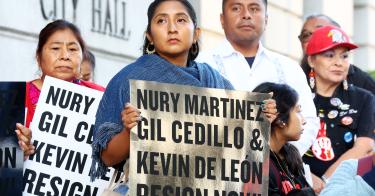For decades, left-wing radicals and elite institutions have made it their goal to unite black Americans and Mexican Americans in Los Angeles under shared grievances. But the signs were there all along that the people on the ground resisted comparisons—and we have been reminded again of that fact quite recently.
The reminder comes from the ruckus over a leaked private conversation laced with racist remarks between three Mexican-American members of the Los Angeles City Council. It culminated with the resignation of Nury Martinez, one of the conversation's participants, as council president. The other two, Kevin de Leon and Gil Cedillo, are still resisting calls to step down.
All three are Democrats—a fact conspicuously omitted by most media outlets—and they left few victim groups untouched. Blacks, gays, Jews, Armenians, and South Asians were scorched. There was even invective hurled at other Mexican Americans, specifically those with more native American background from the Mexican state of Oaxaca, whom one of the councilmen referred to as "little, short, dark people," and whom Martinez disparaged as being "so ugly."
The real ugliness was the conversation, obviously, as it reminded the country once again how mean and petty humans can be when they think no one else is listening.
>>> Democrats Are in Denial About Why They Are Losing Hispanic Voters
In public, Martinez and the others virtue-signal like champions. In June 2020, as she was cutting the city's police budget by a whopping $150 million at the request of Black Lives Matter leaders (contributing to that city's 30 percent increase in homicides in the past two years), Martinez denounced America as being "founded on racial hierarchy."
Well, maybe she was "projecting," as the kids say today.
The Left's dream of crafting a huge voting machine in America's second-largest city has come to pass, as we see with Martinez's 2020 slashing of the police budget and with California's heavy blue tint. But the signs have always been there that Mexican Americans resist having their experience equated to that of black Americans—indeed a false analogy that requires constant grievance stoking on the part of activists.
Already in the 1940s Saul Alinsky, the leftist maverick credited with inventing modern neighborhood organizing, was trying to create a new coalition of voters. The occasion, ironically enough, was the 1947 campaign of Ed Roybal for L.A. City Council, which was part of what UC Berkeley's Kenneth C. Burt called "a turning point in American politics."
Despite his unprecedented mobilization of Mexican-American voters, Roybal lost his race and had to wait until 1949 to be elected councilman. A more concerted effort to organize Mexican Americans around racial grievances came in the 1960s, when the Ford Foundation commissioned UCLA researchers to conduct a huge study based on interviews of 1,550 Mexican Americans in Los Angeles and San Antonio. It was daringly titled "The Mexican-American People, The Nation's Second Largest Minority"—daring because, as it turned out, the respondents did not see themselves that way.
"Prejudice has been a loaded topic of conversation in any Mexican-American community. Indeed, merely calling Mexican-Americans a 'minority' and implying that the population is the victim of prejudice and discrimination has caused irritation among many who prefer to believe themselves indistinguishable [from] white Americans," wrote the researchers.
More to the point, in light of Martinez's comments, the researchers found that "there is the inescapable fact that...even comparatively dark-skinned Mexicans...could get service even in the most discriminatory parts of Texas a generation or two ago."
>>> Great Pride in Being Mexican American in Texas
The report added that "Mexican Americans will probably increasingly come to view themselves as a minority with rectifiable grievances. However, they are not yet easy to merge with the other large minorities in political coalition."
The machine only runs, however, if politicians constantly stoke those grievances. We saw this in 2010, when Barack Obama called on Latinos to say to themselves "We're gonna punish our enemies, and we're gonna reward our friends who stand with us on issues that are important to us" in that year's election.
Obama did it again five years later, when he regaled the Congressional Hispanic Caucus with a story of how Ed Roybal had been humiliated by a white cop in front of his fiancée on the day he proposed to her—something that had happened in 1940, but Obama needed to exhume in order to add, "we are stronger together than we can ever be alone."
The problem with grievance-stoking is that it doesn't actually make anything better. It doesn't offer hope or aspirations, only resentment.
And resentment begets more resentment, so we shouldn't be surprised at the invective we have all just heard from the L.A. City Council.
This piece originally appeared in Newsweek




